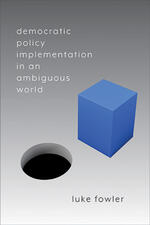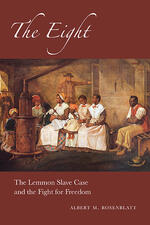
Thirteen Books to Read for Law Day 2024
Law Day 2024 is a national day to celebrate the rule of law and its contributions to the freedoms Americans enjoy. This year's theme is "Voices of Democracy", recognizing that in democracies, the people rule. Join in the conversation about the importance of the rule of law in our society.
Here are thirteen books to #ReadUP on law and democracy.
Democratic Policy Implementation in an Ambiguous World, by Luke Fowler, explains the complexities of policy implementation and why attempts to translate new laws into effective and enduring policy sometimes succeed and sometimes fail.
"An excellent addition for collections on American politics, public policy, and administration." — CHOICE
"By imaginatively applying the multiple streams framework to a wide range of issues, Fowler draws much-needed attention to the nexus of (and sometimes tradeoff between) effective implementation and democratic governance." — Nikolaos Zahariadis, editor of Handbook on Public Policy Agenda Setting
Order, Crisis, and Redemption: Political Theology after Schmitt, by Peter Langford & Saul Newman, is a critical reflection on the limitations of Carl Schmitt's political theology, reconsidered in light of the current crisis of the liberal democratic order.
"Order, Crisis, and Redemption uses an original and scholarly reevaluation of Carl Schmitt's political theology as a springboard for addressing key political issues of the day, such as climate change and the Anthropocene, Neoliberalism, populism, and the decline of the nation-state as a viable political structure for taking humanity into the foreseeable future. It also engages, in a masterful and enlightening fashion, with commentaries on Schmitt (Agamben, Böckenforde). Particularly insightful is the way the work invokes Schmitt's catholic background and catholic theology as a way of clarifying the rationale for Schmitt's approach to a range of issues, but especially the notions of sovereignty and democracy."—John Lechte, author of The Human: Bare Life and Ways of Life
The Eight: The Lemmon Slave Case and the Fight for Freedom, by Albert M. Rosenblatt, is the personal and legal struggle of eight enslaved people for freedom in New York in the period just before the Civil War.
"…a human, humanizing, and timely work." — Hudson River Valley Review
"In his lucid book, unencumbered by legalese, Rosenblatt narrates how, upon reaching New York, abolitionists, Black and white, assisted the eight enslaved people in suing for their freedom. An 1841 New York law granted liberty to any enslaved person brought into the state. Rosenblatt painstakingly charts the successful freedom suit in New York City's Superior Court and ultimately its victory in the New York Court of Appeals." — CHOICE
"The Lemmon affair of the 1850s was New York's Dred Scott case. Raising the question whether eight Black people on a vessel in New York harbor were enslaved or free, the eight-year litigation put the American legal system on a collision course with Civil War. Albert Rosenblatt's lucid and revelatory account of the case brilliantly shows how it threatened to turn every state in the Union into a slave state. Unearthing previously unknown documents, The Eight is the definitive story of this courageous fight—one that is as complete as it is compelling. Historians and lawyers will rely on the book for years to come." — John Fabian Witt, author of Lincoln's Code: The Laws of War in American History
"Albert Rosenblatt's extensive research of the Lemmon Slave Case provides a rare glimpse into the circumstances surrounding the emancipation of eight enslaved individuals. Thanks to Rosenblatt, this history has been brought to life and made more accessible through this thought-provoking book." — Luanne Wills-Merrell, descendant of two of the eight
Deconstructive Constitutionalism: Derrida Reading Kant, by Jacques de Ville, investigates, by way of Derrida's engagements with Kant, how the foundations of modern constitutionalism can be differently conceived to address some of the challenges of the twenty-first century.
"Are our institutions fit for purpose in the era of COVID-19 and climate change? Drawing on Derrida and Heidegger, de Ville interrogates the Kantian assumptions on which our legal and political institutions still rely, addressing key issues of principle from freedom to crime and punishment, the global order, and the human relationship with non-human animals. For legal scholars, the book provides a systematic account of Derrida's critique of conventional legal thinking; for continental philosophy scholars, it represents a major contribution to the study of Derrida's political thought. Over and above that, it suggests new ways in which law and politics must be re-thought in order to meet the challenges of our times." — Nick Mansfield, author of Bastard Politics: Sovereignty and Violence
Much Sound and Fury, or the New Jim Crow?: The Twenty-First Century's Restrictive New Voting Laws and Their Impact, edited by Michael A. Smith, is an intensive look at restrictive new voting laws ostensibly designed to target voter fraud but criticized as being racially-based voter suppression.
"Unique and very timely, this book makes a significant contribution to American politics, state and local politics, and urban politics. The chapters' varied approaches unite to provide an excellent analysis of this extremely important topic." — Sharon D. Wright Austin, author of The Caribbeanization of Black Politics: Race, Group Consciousness, and Political Participation in America
Property Rights in Contemporary Governance, edited by Staci M. Zavattaro, Gregory R. Peterson, and Ann E. Davis, examines how our diverse understandings of property impact real-world governing strategies.
"This book is unique in the field of property theory. First, its essays are rooted in the perspectives of many different fields. Second, the areas that it covers and the vast majority of its content are highly original. While the idea that property and governance are intimately connected is not original, the contributions that the book makes to that idea definitely are. It was fascinating and very useful reading. " — Laura S. Underkuffler, author of The Idea of Property: Its Meaning and Power
Between the Rule of Law and States of Emergency: The Fluid Jurisprudence of the Israeli Regime, by Yoav Mehozay, raises concerns about the degree to which the rule of law and emergency powers have become fundamentally entangled, using Israel as a case study.
"This is an important book, not only for those interested in legal and political theory, but also for scholars seeking to understand how executive power in Israel works and what this means for institutional development of Israeli politics … a must-read for scholars of contemporary law, society, and politics in Israel." — Israel Studies Review
"This book proffers a valuable study of how Israel has used and continues to use State of Emergency (SOE) laws to override and bypass constitutional, Bill of Rights (BOR), legislative (parliamentary), and even governing bodies such as the Knesset to impose SOE rule." — CHOICE
Human Rights Standards: Hegemony, Law, and Politics, by Makau Mutua, a bracing critique of human rights law and activism from the perspective of the Global South.
"…Mutua has delivered a critical analysis of the current state of human rights and the institutions that purport to advance and champion them. The guiding principle of this book is that the importance of history cannot and should not be underestimated … It is highly recommended for human rights campaigners, graduate students and university libraries." — African and Asian Studies
Regulating Desire: From the Virtuous Maiden to the Purity Princess, by J. Shoshanna Ehrlich, examines the organized efforts to reshape the law relating to young women’s sexuality in the United States.
". ..[an] effective and engaging book." — Law and History Review
"…Regulating Desire prompts readers to think critically about the unforeseen consequences of contemporary 'liberal or feminist impulses.'" — Women's Review of Books
"Ehrlich's attempt to locate different legal reform movements within their historical context is rigorous, never reductive." — Harvard Law Review
"This excellent overview of changing views of female sexuality … raises provocative questions about young women's understanding of and control over their own bodies. A valuable contribution to scholarship in sexuality studies, rhetorical analysis, public policy, and legal history, as well as to the emerging field of girls' studies … Highly recommended." — CHOICE
"Extremely thorough and very enjoyable to read, this book provides an authoritative scholarly voice on its subject matter." — Alesha E. Doan, coauthor of The Politics of Virginity: Abstinence in Sex Education
Opening Statements: Law, Jurisprudence, and the Legacy of Dutch New York, edited by Albert M. Rosenblatt & Julia C. Rosenblatt, explores the influence of Dutch law and jurisprudence in colonial America.
"...[an] excellent study of legal and social history … The text is filled with handsome illustrations of portraits, land- and sea- and cityscapes, maps and beautifully written manuscripts, and much else." — The Weathercock
"…every chapter displays a conscientious regard for archival sources which, together with the images, offer a book that anyone interested in the history of New Netherland or New York will find useful." — Law and History Review
"Opening Statements gathers good insights and information, some of it new; is laden with difficult-to-track down facts; and presents a cross-section of loosely related but interesting topics between two handsome covers … lavishly illustrated … [the editors] can be justly proud of their project, four years in the making." — de Halve Maen
"…[a] beautifully designed volume. Thirteen essays and dozens of vivid illustrations reanimate a lost world that will stir the imagination of early Americanists and New York history buffs, while inviting those interested in the legal history of freedom of religion, arbitration, the right of petition, republican sovereignty, and multiculturalism to undertake their own fresh investigations of Dutch New York." — H-Net Reviews (H-Law)
"Opening Statements is a powerful addition to the growing body of work on New Netherland. The Rosenblatts are to be commended for assembling top talents in the field alongside an impressive collection of key illustrations, resulting in a volume that belongs on the must-read list for enthusiasts and professional scholars in a variety of related fields." — Hudson River Valley Review
"Opening Statements is a richly illustrated volume that offers a tantalizing and sometimes surprising view of jurisprudence in the Dutch colonial period and its lasting impact on modern life and law. A litigious people, the Dutch in New Netherland were also practical and pragmatic, turning to the law to settle disputes and to redress grievances. Opening Statements helps us understand what the Dutch rule of law meant to them, how it translated within the British legal system that was imposed after 1664, and what of it has become permanent legacy in America's legal and constitutional system. The essays are clearly and informatively written and provide keen insight into the character of the Dutch colonial system, the values of those who lived within it, the way in which those values and cultural traditions informed their legal system and, most importantly, into the elements of that system that are still evident today." — Christine W. Ward, New York State Archives
"A fascinating voyage through the intriguing subject of the Dutch influence on our law, jurisprudence, and the New York we know today! Remembering the English takeover in 1664, I find myself again and again asking 'What if?' as I conclude each essay by a world-class scholar (whose ample footnotes can carry the reader into far deeper waters), a pleasure cruise enhanced by a breathtaking array of magnificent illustrations. Yes, this captivating volume proves beyond doubt that the subject of the Dutch influence on New York deserves more than a once-a-century celebration." — Judith S. Kaye, Chief Judge of the State of New York (Ret.)
In Friends at the Bar: A Quaker View of Law, Conflict Resolution, and Legal Reform, by Nancy Black Sagafi-nejad, a Quaker lawyer looks at Friends’ relationship with the American legal system and at Friends’ legal ethics.
"This book is a valuable testimonial to the legal work of Quakers … practicing lawyers who question the ethics of their profession and who read Sagafi-nejad's book will be inspired to change the odds in favor of doing good." — H-Net Reviews (H-Law)
"Friends at the Bar would make a valuable addition to the collections of academic law libraries, especially those with extensive holdings in the areas of religion and the law or legal reform … [it] is one of only a handful of monographs to address the Quakers' relationship with the law." — Law Library Journal
"Taken as a whole, Friends at the Bar contributes to the public discourse on legal reform, both as another call to expand alternatives to mainstream legal adversary practice and as a documentation of litigation's historical value in promoting social justice. The alternative perspective on law offered here is refreshing." — Law and Politics Book Review
Murder on Trial:1620-2002, edited by Robert Asher, Lawrence B. Goodheart, and Alan Rogers, is a historical romp through the fascinating subject of murder jurisprudence in the United States from the colonial period to the present, showing how changing social mores have influenced the application of murder law.
Punishing the Mentally Ill: A Critical Analysis of Law and Psychiatry, by Bruce A. Arrigo, is provocative exploration of a wide range of controversies in mental health law, this book argues that the criminal justice system punishes citizens for being mentally ill.
"The book offers key insights and is a genuine contribution to post-modern approaches." — Metapsychology
"The author's analysis is quite illuminating. Indeed, it prompted me to think about the many encounters I have had within the system and the language and conversations I have witnessed. In many ways, I felt the analysis and central arguments provided a new, deeper way of understanding these routine events." — Eric R. Wright, Indiana University-Purdue University Indianapolis
"This is a very thought-provoking book regardless of whether one fully agrees with its findings and conclusions." — Donald M. Linhorst, Saint Louis University
Books Mentioned In This Post

Democratic Policy Implementation in an Ambiguous World

Order, Crisis, and Redemption
Political Theology after Schmitt

The Eight
The Lemmon Slave Case and the Fight for Freedom

Deconstructive Constitutionalism
Derrida Reading Kant

Much Sound and Fury, or the New Jim Crow?
The Twenty-First Century's Restrictive New Voting Laws and Their Impact

Bastard Politics
Sovereignty and Violence

Property Rights in Contemporary Governance

The Caribbeanization of Black Politics
Race, Group Consciousness, and Political Participation in America

Between the Rule of Law and States of Emergency
The Fluid Jurisprudence of the Israeli Regime

Human Rights Standards
Hegemony, Law, and Politics

Regulating Desire
From the Virtuous Maiden to the Purity Princess

Opening Statements
Law, Jurisprudence, and the Legacy of Dutch New York

Friends at the Bar
A Quaker View of Law, Conflict Resolution, and Legal Reform

Murder on Trial
1620-2002

Punishing the Mentally Ill
A Critical Analysis of Law and Psychiatry

